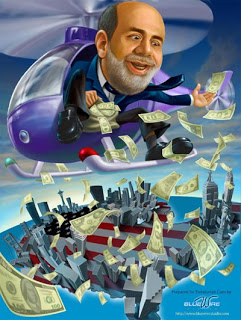Ben Bernanke and the Federal Reserve are at it again. The most recent policy statement by the Federal Open Market Committee (FOMC) said that current inflation is “somewhat below” levels consistent with stable prices, and that it is “prepared to provide additional accommodation if needed to support the economic recovery and to return inflation, over time, to levels consistent with its mandate” to maintain stable prices.
Never mind that in the old days when words actually meant something, stable prices meant prices that were actually stable, that is, did not go up or down. Now it seems that stable prices mean prices that are not actually stable, but are prices that continually go up at an acceptable target rate. Also never mind that, as Mises showed us in his Theory of Money and Credit prices are never actually stable, so the Fed’s price stabilization policy is doomed from the start.
prices are never actually stable, so the Fed’s price stabilization policy is doomed from the start.
A full analysis of any economic policy requires holding up that policy to the light of both economic truth and ethics. There is a voluminous literature documenting the economically disastrous consequences of monetary inflation. Work from the likes of Mises, Hayek, Rothbard, Sennholz, Salerno, Garrison, Huerta de Soto and Hülsmann have ably communicated how inflation through artificial credit expansion shrinks the purchasing power of money and sets in motion the business cycle.
What may be less known is that there is a substantial literature amongst Christian scholastics that were able forerunners of later monetary theorists in the Misesian tradition. Guido Hülsmann in his excellent The Ethics of Money Production identifies a long Christian tradition against monetary inflation. In the fourteenth century Nicholas Oresme, a French bishop, integrated various isolated statements about money by Thomas Aquinas, Jean Buridan, and others, and developed what is believed to be the first systematic treatise on money.
Drawing upon the work of Oresme and Christian ethics, the later Spanish scholastics further developed monetary theory, roundly criticizing monetary debasement and inflation as both economically destructive and morally evil. More recently Christians such as Gary North, Herbert Schlossberg, and Thomas Woods have argued that monetary inflation violates sound ethics.


Be the first to comment on "The Immorality of Government Inflation"